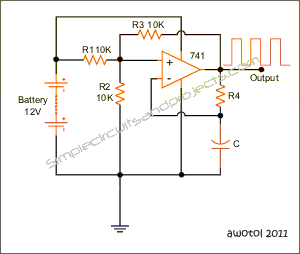Astable multivibration circuit using LM741
The frequency of this astable miltivibrator circuit depends on all the external components connected to the op-amp. The best practice is to fixed the value of some of the components in order to derived a relation for the frequency. Deriving relation for the frequency is simple if R1, R2 and R3 are fixed with equal value. That is R1 = R2 = R3 = R.
In an ideal situation, it can be shown that the frequency, f of the oscillation is
The frequency of this astable miltivibrator circuit depends on all the external components connected to the op-amp. The best practice is to fixed the value of some of the components in order to derived a relation for the frequency. Deriving relation for the frequency is simple if R1, R2 and R3 are fixed with equal value. That is R1 = R2 = R3 = R.
In an ideal situation, it can be shown that the frequency, f of the oscillation is
Just like Schmitt trigger that has VT+ and VT-, non-inverting input of the op-amp is either 2/3 or 1/3 of the supplied voltage so that the capacitor, C charges and discharges in between these voltages.
How were 2/3Vcc and 1/3Vcc arrived at?
The figures below will be used to compute the voltages at the non-inverting input of the op-amp, i.e positive and negative going threshold voltage of the circuit between which capacitor charges and discharges. (A) occurs when the output of the op-amp is 'high' while (B) is when the output is 'low'
How were 2/3Vcc and 1/3Vcc arrived at?
The figures below will be used to compute the voltages at the non-inverting input of the op-amp, i.e positive and negative going threshold voltage of the circuit between which capacitor charges and discharges. (A) occurs when the output of the op-amp is 'high' while (B) is when the output is 'low'
The figures below show the equivalent circuits of the above figure after applying circuit theorems (equivalent resistance and voltage divider).
Using the formula that was derived for frequency of an astable multivibrator using Schmitt trigger with VT+ and VT- being replaced with 2Vcc/3 and Vcc/3 respectively.
Click here for astable (comparator) calculator





Well written and very informative. Thanks very much.
ReplyDelete